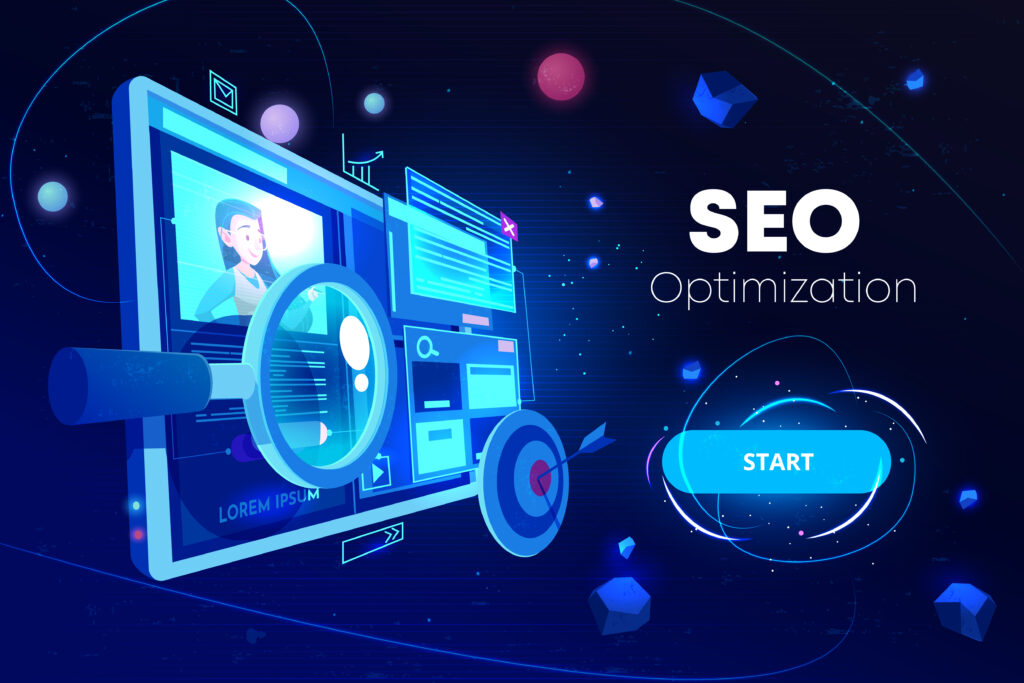Introduction to AI in SEO
Artificial Intelligence (AI) is revolutionizing the digital marketing landscape, bringing about transformative changes in search engine optimization (SEO) strategies. By integrating AI, businesses can enhance their online visibility, automate complex processes, and deliver personalized content to users. The convergence of AI with SEO offers unprecedented opportunities to optimize search rankings and understand user behavior in more depth.
AI technologies provide sophisticated tools that analyze vast amounts of data quickly and accurately. This capability allows SEO professionals to gain insights into search trends and user engagement metrics, making data-driven decisions that propel their websites to the top of search engine results pages (SERPs). Embracing AI in SEO practices is becoming essential for maintaining a competitive edge in the rapidly evolving digital arena.
Understanding AI and Its Role in SEO
AI is fundamentally altering how SEO strategies are formulated, focusing on automation and predictive analytics. With AI, SEO experts can predict future trends and user behaviors, tailoring content to meet the anticipated needs of their target audience. This proactive approach to SEO helps businesses stay ahead of their competitors and meet search engine criteria more effectively.
Moreover, AI enhances the accuracy of keyword research and optimization, enabling more targeted content strategies. It automates routine tasks, such as traffic analysis and backlink profiling, freeing up marketers to focus on creative aspects of SEO like content creation and multimedia integration.
- AI tools can predict the rise of new search terms before they become mainstream.
- Automated reports generated by AI help identify SEO opportunities in real-time.
- AI-driven chatbots improve user engagement by providing instant responses to user inquiries.
The Evolution of SEO with AI Technologies
The adoption of AI in SEO began with simple automation for tracking rankings and has evolved into more complex applications that influence almost every aspect of SEO strategy. Modern AI systems can interpret the context of content, assess the quality of backlinks, and even suggest improvements in site architecture.
This evolution marks a shift from manual to intelligent SEO, where decisions are made based on comprehensive data analysis. Businesses leveraging AI in SEO can adapt more swiftly to algorithm changes by search engines, ensuring their websites remain compliant and competitive.
- Integration of AI with SEO tools has increased the accuracy of content sentiment analysis.
- AI helps in identifying the SEO impact of structural changes on a website.
- Advanced AI models enable the simulation of different SEO strategies to predict their potential success.
Key AI Technologies for SEO
AI encompasses various technologies that each play a unique role in enhancing SEO performance. Machine learning algorithms analyze search data and optimize content distribution strategies, while natural language processing (NLP) improves the understanding and generation of human-like text. These technologies are essential for developing SEO strategies that align with the nuanced demands of modern search algorithms.
Machine Learning and Predictive Analytics
Machine learning is at the core of predictive analytics, offering SEO professionals tools to forecast future trends and user actions. By analyzing past behavior, machine learning models can suggest which content types are likely to perform well, which keywords will gain popularity, and how users will interact with different formats.
This forward-looking approach not only optimizes current strategies but also anticipates the needs of the audience, resulting in higher engagement and improved SERP positions. Implementing machine learning in SEO campaigns can significantly enhance the effectiveness of marketing efforts by focusing on data-driven outcomes.
- Machine learning models can optimize website navigation based on user engagement statistics.
- Predictive analytics tools monitor changes in user behavior to adjust SEO strategies accordingly.
- Real-time adjustments to SEO strategies are possible with machine learning insights.
Natural Language Processing (NLP)
Natural language processing (NLP) empowers SEO tools to understand and generate text in a way that is both appealing to humans and favorable to search engines. NLP techniques are used to optimize content for voice search and long-tail keyword queries, addressing the growing demand for conversational AI in search experiences.
With the integration of NLP, websites can improve their content’s relevance and readability, which are key factors in search engine rankings. NLP also enhances semantic search capabilities, allowing search engines to grasp the context of web pages better and match them more accurately with user intents.
- NLP is critical for optimizing content for the rapidly growing voice search queries.
- Enhanced understanding of user intent through NLP leads to more effective keyword usage.
- Content tailored by NLP is more likely to engage users and reduce bounce rates.
AI-Powered Automation Tools
Automation is a key benefit of using AI in SEO, where repetitive and time-consuming tasks are managed efficiently. AI-powered tools can automatically optimize meta tags and images, monitor site performance, and track ranking changes across various search engines. This automation ensures that SEO practices are consistently applied across all content without requiring manual oversight.
Furthermore, these tools provide recommendations for improvements based on real-time data, such as adjusting content length, keyword density, and internal linking strategies. By leveraging AI for these tasks, businesses can focus more on strategy and content creation, relying on AI to handle the operational details.
Practical Strategies to Implement AI in SEO
Incorporating AI into SEO strategies involves more than just using AI tools; it requires a fundamental understanding of how AI can enhance various aspects of SEO. Businesses need to identify which areas of their SEO strategy can benefit most from AI integration, such as content creation, link building, or user experience enhancements.
Enhancing Content Creation with AI
AI can significantly transform the content creation process by generating ideas, suggesting content formats, and even writing initial drafts of text. AI-driven content tools analyze existing content and competitor sites to recommend topics that are likely to resonate with the audience. This ensures that all content is optimized for both search engines and user engagement.
Additionally, AI can help maintain a consistent brand voice across all content and can scale content production to meet the demands of content marketing campaigns. This scalability is crucial for businesses looking to expand their online presence quickly.
Improving User Experience with AI Insights
User experience (UX) is increasingly becoming a critical SEO factor, and AI can play a significant role in optimizing it. By analyzing user behavior data, AI can suggest website design changes that improve navigation and increase page engagement. These insights help ensure that users find what they need quickly and easily, which reduces bounce rates and improves overall site performance.
AI tools can also personalize user experiences by displaying content or product recommendations based on individual user behavior. This personalization not only enhances the user experience but also boosts the chances of conversion, directly impacting the site’s SEO success.
AI for Keyword Research and Optimization
Keyword research and optimization are foundational elements of SEO, and AI tools can enhance these processes by uncovering new keyword opportunities and optimizing content for those keywords. AI analyzes search queries, user intent, and competitive keywords to suggest the best terms for content creation. This helps in crafting strategies that align closely with what users are searching for.
Moreover, AI can track keyword performance and dynamically adjust strategies based on what’s working. This ability to adapt quickly to changing search trends is invaluable in maintaining high search rankings.
Case Studies: Success Stories of AI in SEO
Examining real-world examples of AI in SEO provides practical insights into its effectiveness. These case studies demonstrate how different companies have successfully integrated AI into their SEO strategies, resulting in measurable improvements in traffic, engagement, and conversions.
Case Study 1: Boosting Organic Traffic
A major e-commerce retailer implemented AI to optimize their product descriptions and meta tags, resulting in a 50% increase in organic traffic over six months. The AI tools analyzed user engagement and sales data to continuously refine content, ensuring that product pages were optimized for both search engines and customer conversions.
The success of this strategy highlights the power of AI in transforming SEO practices, making them more dynamic and responsive to user needs and behaviors.
Case Study 2: Improving SERP Rankings
By utilizing AI-driven content optimization tools, a technology blog was able to double its visibility on search engine results pages within three months. The AI system provided insights into optimal content length, keyword usage, and internal linking, which were key factors in improving the site’s rankings.
This case study underscores the importance of data-driven SEO strategies and how AI can facilitate significant improvements in SERP positions through detailed content analysis and optimization recommendations.
Case Study 3: Personalization and User Engagement
An online news portal used AI to personalize content displays and recommendations for its users, which led to a 30% increase in page views per visitor. AI analyzed user preferences and reading habits to curate content that matched individual interests, substantially increasing engagement and time spent on the site.
This approach not only improved user satisfaction but also signaled to search engines that the content was valuable, thereby enhancing SEO outcomes.
Tools and Resources for AI-Enhanced SEO
Selecting the right AI tools is critical for successfully implementing AI in SEO strategies. Various tools are available that cater to different aspects of SEO, from content creation to link building and user experience enhancement. Businesses should evaluate these tools based on their specific needs and the features offered to ensure they complement their existing SEO efforts.
Conclusion
AI is reshaping the SEO landscape by offering innovative ways to enhance content relevance, optimize website performance, and engage users. As search engines continue to evolve, integrating AI into SEO strategies will not only become more common but also necessary for achieving sustained online success. Businesses that adopt AI early will likely see significant advantages over competitors, paving the way for future growth and success in the digital marketplace.

